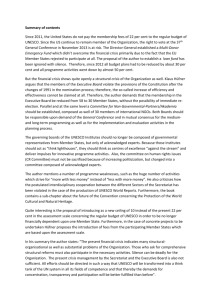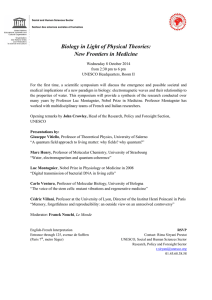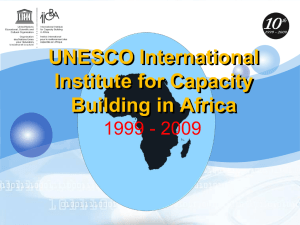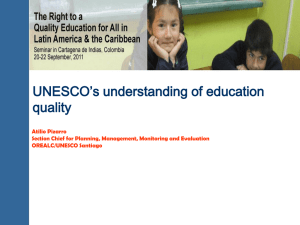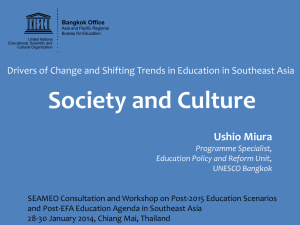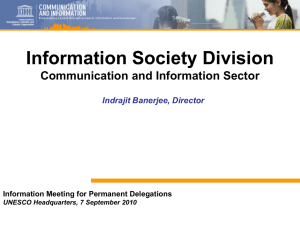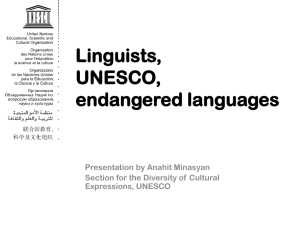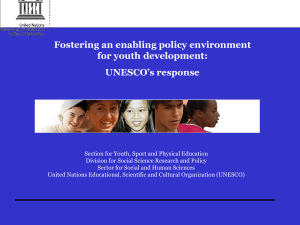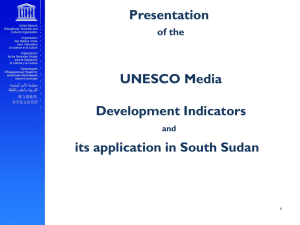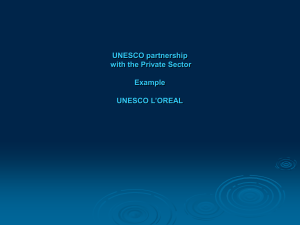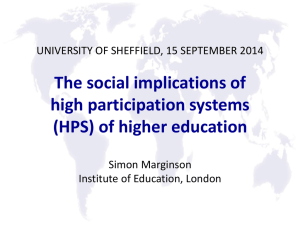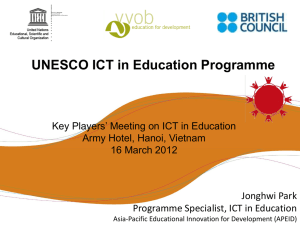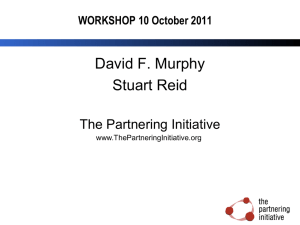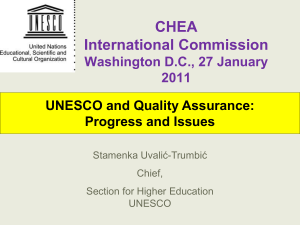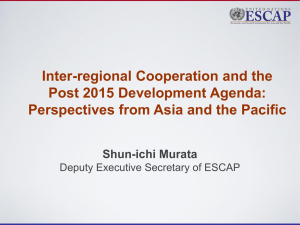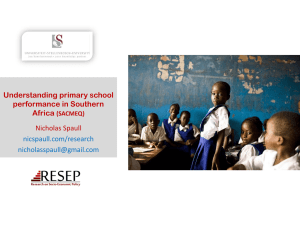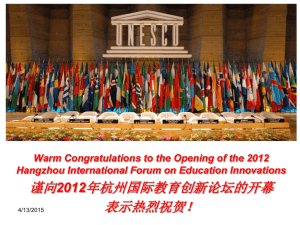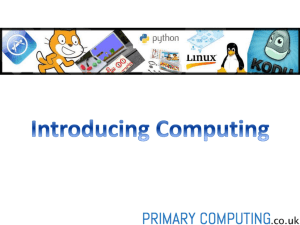South-South Cooperation Fund in Education
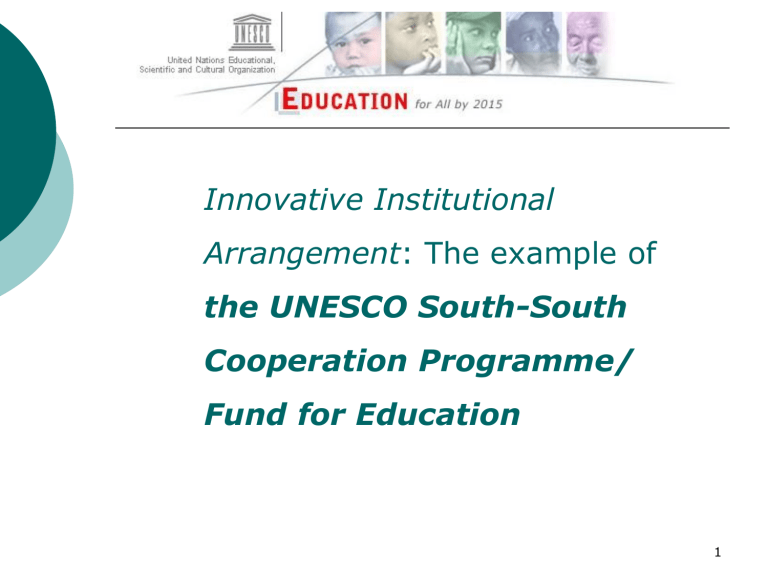
Innovative Institutional
Arrangement: The example of the UNESCO South-South
Cooperation Programme/
Fund for Education
1
Background
-
-
-
-
UNESCO’s innovative institutional arrangement to actively promote education through South-South and North-South-South Cooperation
South-South Cooperation Programme/Fund established in 2007 by UNESCO Executive Board
Result of sustained effort by G77 and China to bring the issue of south-south cooperation to the attention of Member States
Fund fully operational since January 2008 following establishment of governance and coordinating mechanism through a Steering
Committee, and nomination of a Chair working closely with the UNESCO Education Sector 2
What is ‘innovative’ about the Fund?
This Fund is unique amongst the various South-
South Funds managed by multilateral organisations, in that it is dedicated exclusively to supporting projects in the field of education
Fund established at the initiative of countries of the South – the G77 & China - with funding pooled so far only from developing countries
Projects selected on the basis of regional priorities, through a democratic participatory process, involving G-77 & China Regional
Groups and UNESCO’s regional offices
The Fund promotes the Education for All and
Millennium Development Goals
3
Pilot Projects currently implemented by the Fund
-
-
-
-
Adult Literacy and Non-Formal
Education (NFE) – Arab States
ICT in Education Teacher Training –
Asia-Pacific Region
Mother-tongue based multilingual education - Africa
Promoting disaster preparedness in schools – Latin America &
Caribbean
4
Brief presentation of regional pilot projects (1)
-
-
-
The Arab States project focuses on Adult literacy and
Non-Formal education (NFE) - it has 3 main objectives:
To review current practices; identify gaps; and share existing good practices in the region;
To develop robust systems for monitoring adult literacy and NFE to cater to the information needs of major agents involved in NFE and literacy activities in the Arab region
To strengthen the capacity of literacy and NFE planners and managers in the area of education management information systems (NFE-MIS), monitoring and evaluation
5
Brief presentation of regional pilot projects (2)
The Africa region project on mother-tongue based
multilingual education seeks to identify best practices in terms of teaching approaches, including innovative use of teaching and learning materials, that can be replicated/adapted in other countries with similar challenges, to improve learning outcomes
This project responds to an issue of major concern in Africa. In many countries, school children are struggling with a foreign language of instruction, inherited from the colonial period, which is contributing to low levels of achievement, and poor quality of education in general, and more specifically among the most vulnerable groups.
Sharing of best practices is a concrete step in sensitizing policy-makers about ways to overcome current hurdles and improving the situation of languages in education
6
Brief presentation of regional pilot projects (3)
The theme of the Latin America and Caribbean
(LAC) Project - Promoting disaster preparedness
in schools - is an issue which concerns all parts of the world, especially in the face of climate change and global warming
Through this project, UNESCO regional office for LAC is working with the network of UNESCO Associated
Schools, in view of equipping school children with skills and knowledge to enable them to take an active role in community protection and environmental stewardship
Within the project, teaching/learning tools are developed and shared, and best practices made available through an online database
7
Brief presentation of regional pilot projects (4)
The Asia-Pacific project on ICT in Education
teacher training builds on the vast experience of the UNESCO Regional Asia-Pacific office in the area of ICT in Education
It seeks to strengthen a network of Teacher Training
Institutions in the region by developing their capacities in training teachers to use ICT effectively.
Within the project, an online platform has been established and teacher training materials made available both electronically and on CD-ROMs
Currently the project team is producing an online version of the e-learning materials to facilitate wider access and learning processes
8
Challenges & Way forward
The UNESCO South-South Cooperation
Programme/Fund in Education has so far benefited only from support of developing countries
The pilot projects initiated with seed money from developing countries have great potential to be expanded, but they require further funding from new partners, especially partners of the North
There has been some reticence by development partners to contribute to the Fund although the governance mechanism including a Steering
Committee are in place and the Fund is fully operational
9
Challenges & Way forward
(ctd)
Without due attention paid to areas such as literacy/adult learning, Non-Formal Education, teacher education, which are of vital importance for many E-9 countries ( Bangladesh,
Brazil, China, Egypt, India, Indonesia, Pakistan,
Mexico and Nigeria) , the EFA and MDG Goals will not be attained in many of these highly populated countries
Maintaining and increasing the level of investment in Education, especially in the countries of the South, is key to economic development and global stability.
Effective and innovative partnerships are the way forward.
10
How to support the Fund
To support the Fund, please contact:
Focal Point for South-South
Cooperation Programme/
Fund for Education
UNESCO Education Sector
Email: j.conhye-soobrayen@unesco.org
11

